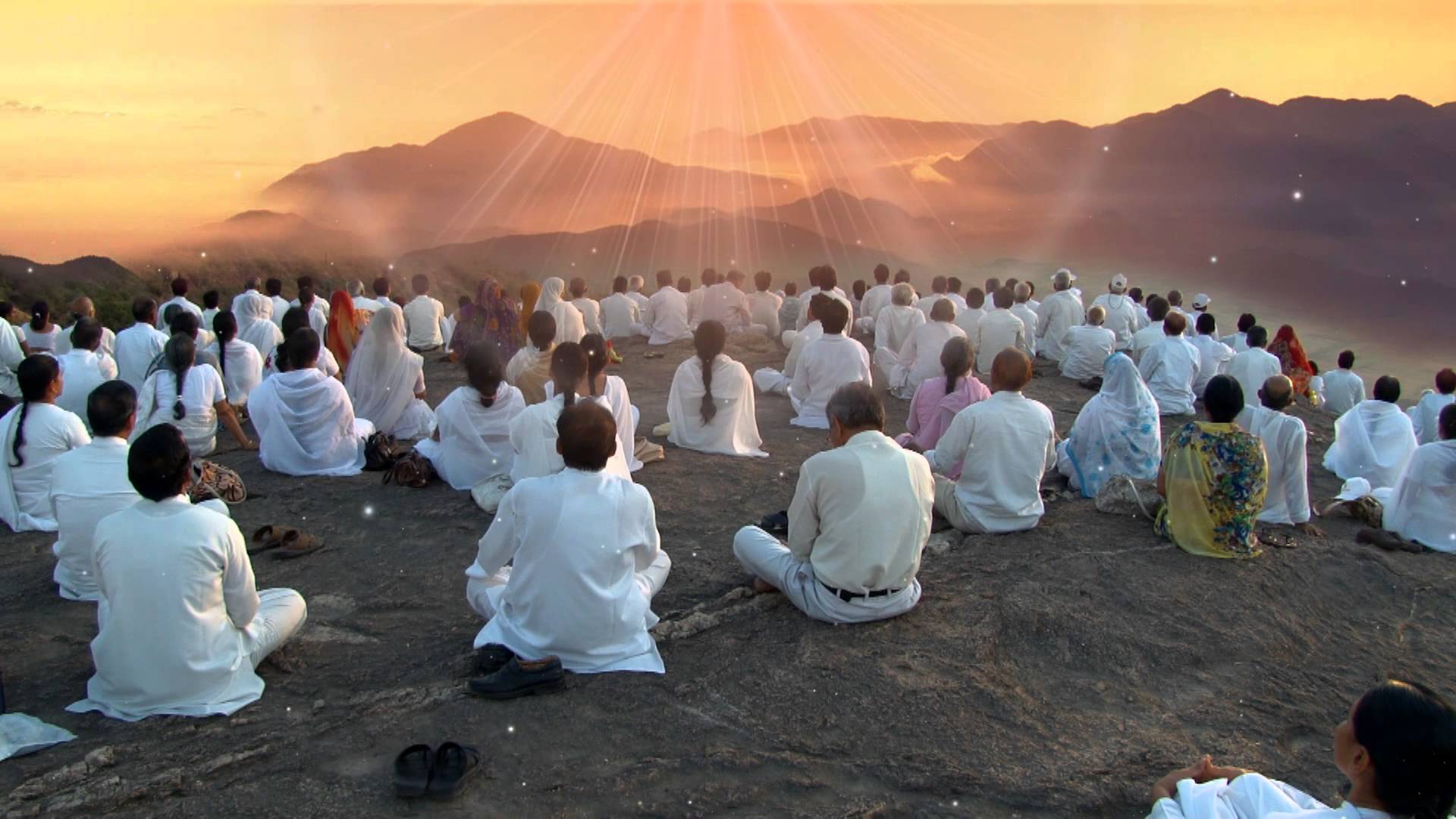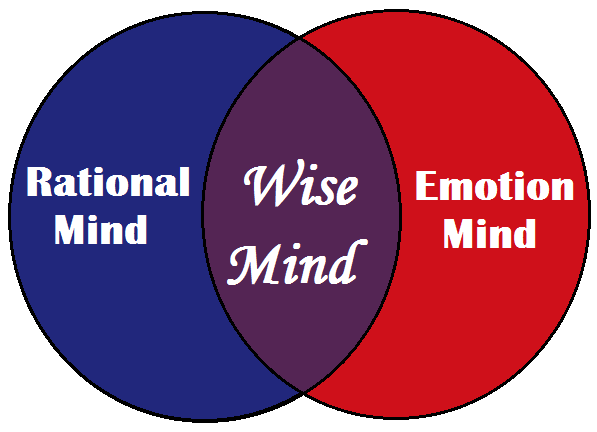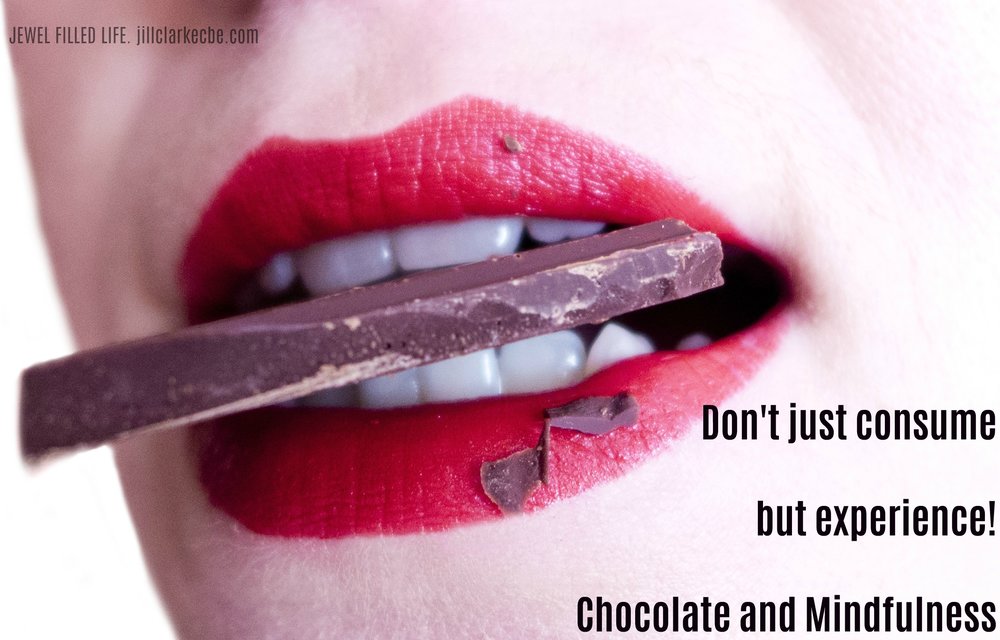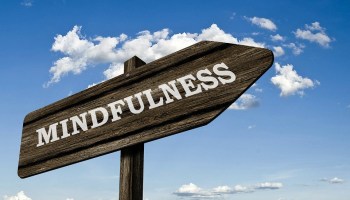mindfulness
Jon Kabat-Zinn – the godfather of modern Mindfulness
Jon Kabat-Zinn – the godfather of modern Mindfulness
by Janette Grant 19th March 2018
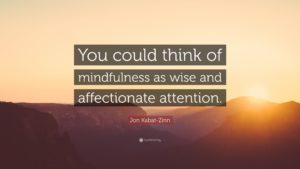
‘You could think of mindfulness as wise and affectionate attention’ – Jon Kabat-Zinn
Since the start of our Mindfulness site we have spent hours, days and weeks talking about how mindfulness can help us in many parts of our lives. So I thought it would be interesting to share with you the story of Jon Kabat-Zinn – the godfather of what, we know of today, as Mindfulness .
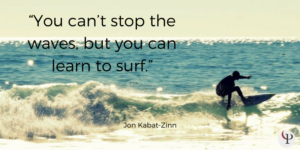
‘You can’t stop the waves, but you can learn to surf’ Jon Kabat-Zinn
Jon Kabat-Zinn was born on the 5th June 1944 in New York, USA and was the youngest of nine children. In 1971, he gained a Ph.D in Molecular Biology, after studying under Salvador Luria – a Nobel Laureate in medicine. Kabat-Zinn is a professor emeritus of medicine and in 1979, he created the Stress Reduction Clinic and the Centre for Mindfulness in Medicine, Health Care, and Society at the University of Massachusetts Medical School. This was after he had studied with Buddhist teachers including Thich Nhat Hanh and Zen Master Seung Sahn, after first being introduced to meditation by Philp Kapleau – a Zen missionary – and this led him to integrate their teachings with scientific findings. Kabat-Zinn adapted their Buddhist teachings on mindfulness when he saw how it could help people cope with stress, anxiety, pain, and illness, and the eight-week, stress reduction program created by him, (mindfulness-based stress reduction – MBSR) is now offered by many medical centres, hospitals and health maintenance organisations. By removing the Buddhist framework, and eventually disconnecting mindfulness and Buddhism, he preferred to apply MBSR within a scientific context, rather than a religious frame. Kabat-Zinn had been meditating since 1965, but he is not a Buddhist and he felt it important to play down the role of Buddhism in mindfulness and for it not to be just seen as ‘new age’ or eastern mysticism. He affirms that to argue that mindfulness meditation is Buddhist is like saying gravity is English because it was identified by Sir Isaac Newton!
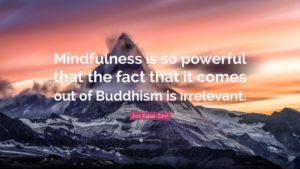
‘Mindfulness is so powerful that the fact that it comes out of Buddhism is irrelevant’ Jon Kabat-Zinn
MBSR program gained momentum when Kabat-Zinn published his first book (Full Catastrophe Living: How to cope with stress, pain and illness using mindfulness meditation) in 1991, which gives full instructions for mindfulness practise and explains his approach to accepting whatever life throws at us. An alternative to the book is the Full Catastrophe Living audio CD – it explains meditation clearly and simply and what can be better than listening to a book being read by the author?!
‘Maybe the fear is that we are less than we think we are, when the actuality of it is that we are much much more’
The Public Broadcasting System special Healing and the Mind featured his Stress Reduction Clinic in 1993, which increased the interest in MBSR and helped Kabat-Zinn to become more well-known. Then in 1994, his 2nd book (Wherever You Go, There You Are: Mindfulness meditation for everyday life) became a national best-seller and subsequently, by the late 1990s, many MBSR clinics were opened.
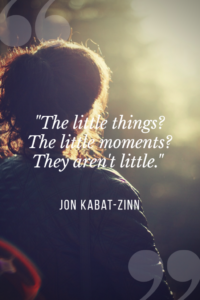
‘The little things? The little moments? They aren’t little’ Jon Kabat-Zinn
Kabat-Zinn founded the original Stress Reduction Clinic by recruiting chronically ill patients – including people with chronic back pain, victims of industrial accidents, cancer patients and paraplegics – who were not responding well to traditional treatments. They participated in his new eight-week stress-reduction course, which we now know as MBSR, and considerable studies since, have shown how mindfulness-based interventions can greatly improve mental and physical health – even when compared with other psychological interventions. Kabat-Zinn has defined mindfulness meditation as ‘the awareness that arises from paying attention, on purpose, in the present moment and non-judgmentally’ By focusing on our breath, we bring attention to our body and mind as it is moment to moment, so helping with pain, both physical and emotional.
‘Intelligence is the door to freedom and alert attention is the mother of intelligence’
He comments that ‘practising mindfulness often results in apprehending the constantly changing nature of sensations, even highly unpleasant ones, and thus their impermanence, and it also gives rise to the direct experience that “the pain is not me” ‘ Consequently, some of his patients found different ways to deal with their pain and others felt it diminish.
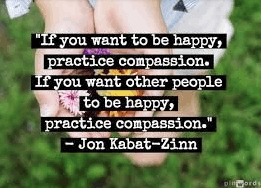
‘If you want to be happy, practise compassion. If you want other people to be happy, practise compassion’ Jon Kabat-Zinn
Kabat-Zinn has been the catalyst for the enormous increase in mindfulness practise and now, in the present age of wars & disasters etc, he fervently believes that mindfulness could transform and heal the world. Mindfulness courses, originating from his work, are already being implemented for school pupils, hospital staff, civil servants and even prisoners. It is used in the NHS in the UK to prevent recurrent depression, with over 2000 people taking part in the eight-week courses in 2016 and the likelihood of relapse into depression being cut by over 30%. In the US, the coach of the NBA basketball champions, Golden State Warriors, made mindfulness one of the team’s core values and the comedian Ruby Wax helped to further popularise mindfulness in her recent book Sane New World: Taming the Mind, when she was taught it at Oxford University to help to deal with her depression.
‘We take care of the future best, by taking care of the present now’
Jon Kabat-Zinn has been described as Mr Mindfulness and it has been questioned whether mindfulness would have risen to the prominence it has without him. Willem Kuyken, a professor of clinical psychology at Oxford University, believes Kabat-Zinn‘s pioneering work may some day see him thought of as comparable to Darwin and Einstein – ‘What Darwin and Einstein did for biology and physics, Jon has done for the science of the human mind and heart’.
‘One very important domain of our lives and experience that we tend to miss, ignore, abuse, or lose control of – as a result of being in autopilot – is our own body’
‘As long as you are breathing there is more right with you than wrong with you’ Jon Kabat-Zinn
Kabat-Zinn is convinced that mindfulness must now be expanded more than ever seen before, to challenge the way the world is run. He avows that ‘If this is another fad, I don’t want to have any part of it – but if in the past 50 years I had found something more meaningful, more healing, more transformative and with more potential social impact, I would be doing that’. Strong words indeed! It’s easy to understand why he still chooses to travel around the world, speaking with governments etc. to spread the message about what mindfulness can achieve. He has recently written a paper arguing that this could be a pivotal moment for our species to come to our senses, mobilising the mainstream world to recognise the power of mindfulness. He states that meditation is ‘the radical act of love and sanity’ that can help manage the fear and aversion he believes underpins so many of the world’s problems. He also comments ‘The human mind, when it doesn’t do the work of mindfulness, winds up becoming a prisoner of its myopic perspectives that puts ‘me’ above everything else. We are so caught up in the dualistic perspectives of ‘us’ and ‘them’, but ultimately there is no ‘them’ – that’s what we need to wake up to’
‘Our ability to touch love and kindness and be touched by them lies buried below our own fears and hurts, below our greed and our hatreds, below our desperate clinging to the illusion that we are operate and alone’
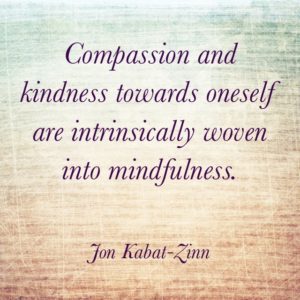
‘Compassion and kindness towards oneself are intrinsically woven into mindfulness’ Jon Kabat-Zinn
Kabat-Zinn says that ‘the science of meditation is in its infancy – we need decades more study; people talk about artificial intelligence and machine learning, but we haven’t scratched the surface of what human intelligence is really all about….’

Mindfulness for Beginners: Reclaiming the Present Moment and Your Life
A great book to learn about mindfulness, with Kabat-Zinn presenting the key attitudes and practises for transforming our lives.
Coming to Our Senses: Healing Ourselves and the World through Mindfulness
The definitive book for our time on the connection between mindfulness and our physical and spiritual wellbeing.
Arriving at Your Own Door: 108 lessons in Mindfulness
A beautifully illustrated collection of 108 verses excerpted from Coming to our Senses to achieve deeper understanding of ourselves.
Guided Mindfulness Meditation audio CD
This CD can help begin or deepen a daily meditation practise to bring mindfulness into every aspect of life.
mindfulness
50 Mindfulness quotes

50 Mindfulness quotes to inspire and uplift us!
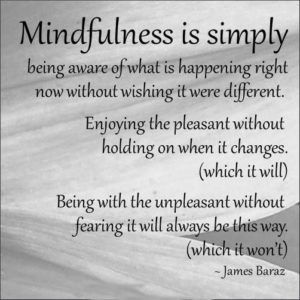
‘Mindfulness is simply being aware of what is happening right now without wishing it were different.
Enjoying the pleasant without holding on when it changes (which it will).
Being with the unpleasant without fearing it will always be this way (which it won’t). – James Baraz
by Janette Grant 16th June 2018
Sometimes all we need is a visual reminder to keep us focusing on the present moment, so I thought I’d bring us a page of mindfulness quotes to give us a little extra inspiration. A good quote can quickly sum up something meaningful in just a few words and may even help us to understand mindfulness better.
Here are some of my favourite quotes from many of the main mindfulness leaders, and others, about being mindful in general:

‘The little things? The little moments? They aren’t little’ Jon Kabat-Zinn

‘Mindfulness is a way of befriending ourselves and our experience’ Jon Kabat-Zinn
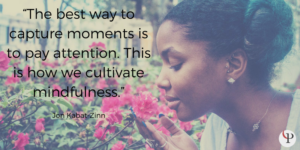
‘ The best way to capture moments is to pay attention. This is how we cultivate mindfulness’ Jon Kabat-Zinn
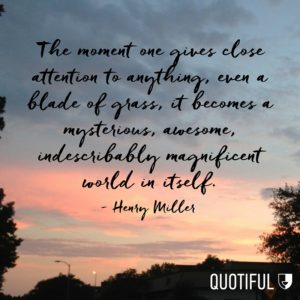
‘The moment one gives close attention to anything, even a blade of grass, it becomes a mysterious, awesome, indescribably magnificent world in itself.’ – Henry Miller

‘Don’t let life harden your heart’ – Pema Chödrön
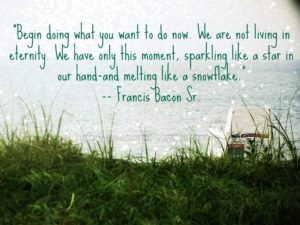
‘Begin doing what you want to do now. We are not living in eternity. We have only this moment, sparkling like a star in our hand – and melting like a snowflake.’ – Francis Bacon Sr.
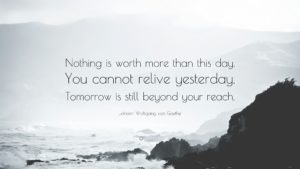
‘Nothing is worth more than this day. You cannot relive yesterday. Tomorrow is still beyond your reach.’ – Johann Wolfgang von Goethe
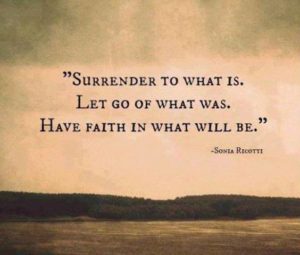
‘Surrender to what is. Let go of what was. Have faith in what will be’ – Sonia Recotti
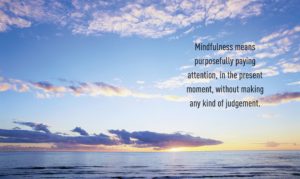
Mindfulness means purposely paying attention, in the present moment, without making any kind of judgment’
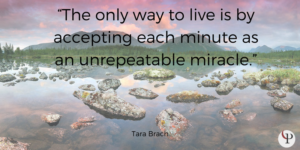
‘The only way to live is by accepting each minute as an unrepeatable miracle’ – by Tara Brach
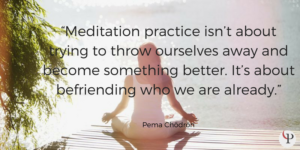
‘Meditation practice isn’t about trying to throw ourselves away and become something better. It’s about befriending who we are already.’ – Pema Chödrön
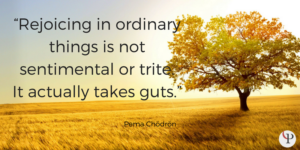
‘Rejoicing in ordinary things is not sentimental or trite. It actually takes guts.’ – by Pema Chödrön
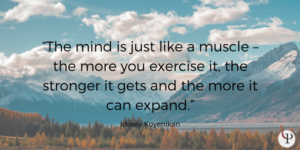
‘The mind is just like a muscle – the more you exercise it, the stronger it gets and the more it can expand.’
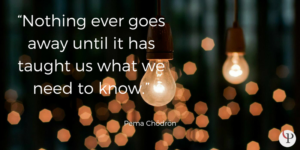
‘Nothing ever goes away until it has taught us what we need to know’ – Pema Chödrön

‘Treat everyone you meet as if they were you’
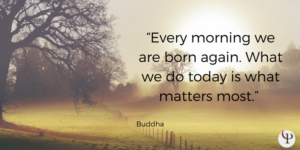
‘Every morning we are born again. What we do today is what matters most.’ – Buddha
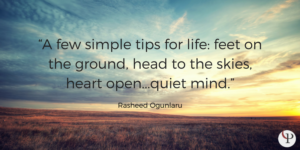
‘A few simple tips for life: feet on the ground, head to the skies, heart open, quiet mind’ – Rasheed Oguniaru
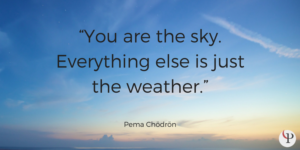
‘You are the sky, everything else is just the weather’ – Pema Chödrön
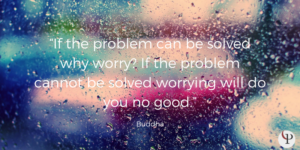
‘If the problem can be solved why worry? If the problem cannot be solved worrying will do you no good’ – Buddha
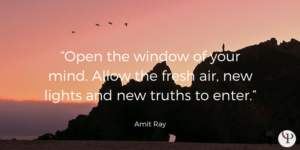
‘Open the window of your mind. Allow the fresh air, new lights and new truths to enter’ – Amit Ray
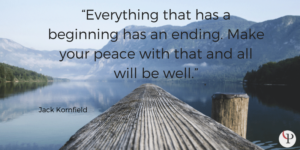
‘Everything that has a beginning has an ending. Make your peace with that and all will be well. – Jack Kornfield
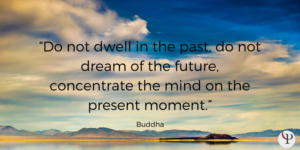
‘Do not dwell in the past, do not dream of the future, concentrate the mind on the present moment’ – Buddha
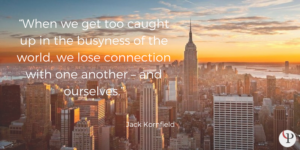
‘When we get too caught up in the busyness of the world, we lose connection with one another – and ourselves’ – Jack Kornfield
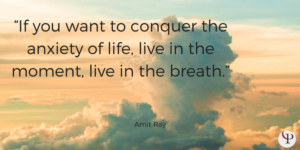
‘If you want to conquer the anxiety of life, live in the moment, live in the breath’ – Amit Ray
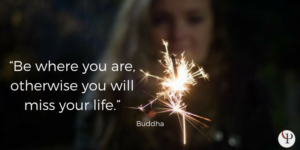
‘Be where you are, otherwise you will miss your life’ – Buddha
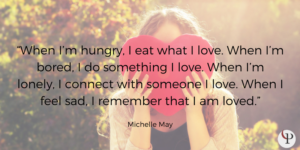
‘When I’m hungry, I eat what I love. When I’m bored, I do something I love. When I’m lonely, I connect with someone I love. When I feel sad, I remember that I am loved’ – Michelle May
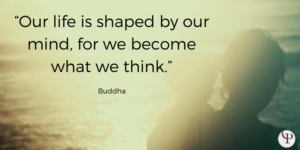
‘Our life is shaped by our mind, for we become what we think’ – Buddha
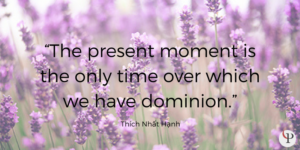
‘The present moment is the only time over which we have dominion’ – Thich Nhãt Hanh
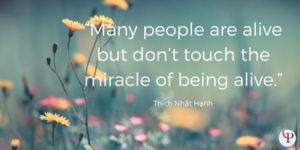
‘Many people are alive but don’t touch the miracle of being alive’ – Thich Nhãt Hanh
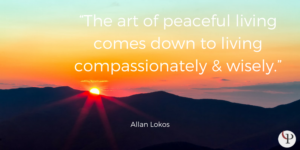
‘The art of peaceful living comes down to living compassionately and wisely.’ – Allan Lokos
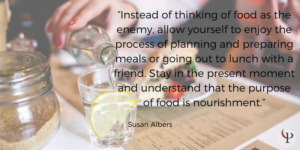
‘Instead of thinking of food as the enemy, allow yourself to enjoy the process of planning and preparing meals or going out to lunch with a friend. Stay in the present moment and understand that the purpose of food is nourishment.’ – Susan Albers
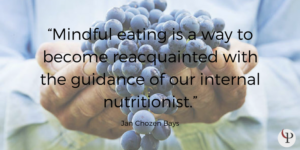
‘Mindful eating is a way to become reacquainted with the guidance of our internal nutritionist.’ – Jan Chozen Bays
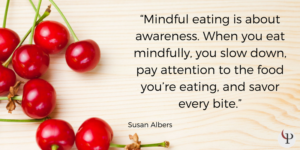
‘Mindful eating is about awareness. When you eat mindfully, you slow down, pay attention to the food you are eating, and savor every bite.’ – Susan Albers
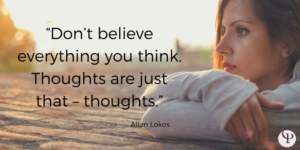
‘Don’t believe everything you think. Thoughts are just that – thoughts.’ – Allan Lokos
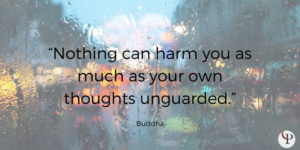
‘Nothing can harm you as much as your own thoughts unguarded.’ – Buddha
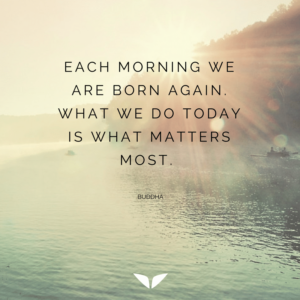
‘Each morning we are born again. What we do today is what matters most.’ – Buddha
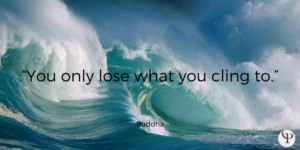
‘You only lose what you cling to.’ – Buddha
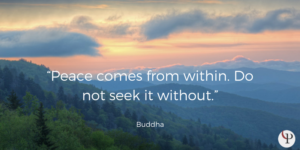
‘Peace comes from within. Do not seek it without.’ – Buddha
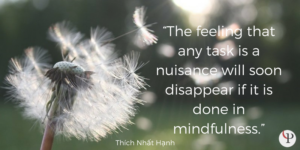
‘ The feeling that any task is a nuisance will soon disappear if it is done in mindfulness.’ – Thich Nhãt Hanh
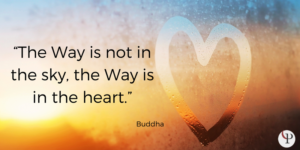
‘The Way is not in the sky, the Way is in the heart’ – Buddha

‘What you think you Become.’
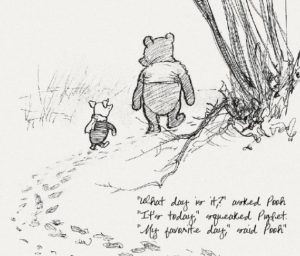
‘”What day is it?” asked Pooh. “It’s today.” squeaked Piglet. “My favourite day” said Pooh’
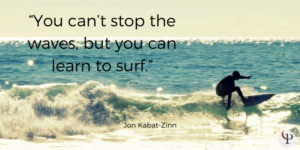
‘You can’t stop the waves, but you can learn to surf.’ – Jon Kabat-Zinn
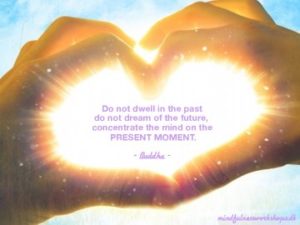
‘Do not dwell in the past, do not dream of the future, concentrate the mind on the present moment.’ – Buddha
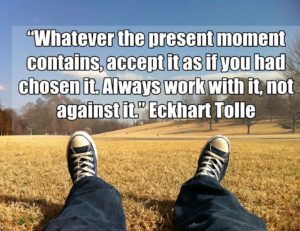
‘Whatever the present moment contains, accept it as if you had chosen it. Always work with it, not against it.’ – Eckhart Tolle
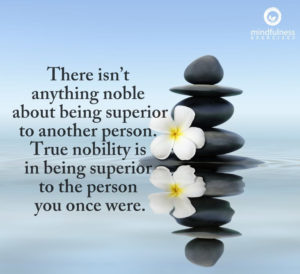
‘There isn’t anything noble about being superior to another person. True nobility is in being superior to the person you once were.’
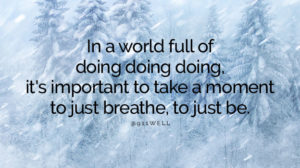
‘In a world full of doing doing doing, it’s important to take a moment to just breathe, to just be.’
I hope that the above quotes were inspiring to you, and especially hope that they have given you something new to reflect on for your mindfulness practice. I love to concentrate on a different quote every day and it definitely helps to have the image in my mind, along with the quote, to help me focus on the words.
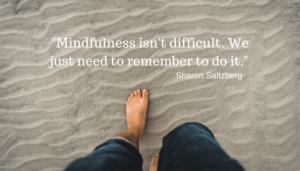
‘Mindfulness isn’t difficult…We just need to remember to do it.’ – Sharon Salzberg
If you’d like to continue exploring more inspirational quotes these will help you develop more mindfulness:
The Little Book of Wisdom: Change Your Outlook One Day at a Time – this is a collection of advice and teachings from the Dalai Lama, with his helpful insights on daily living, compassion and inner peace. Whatever our beliefs, his words have the power to calm and inspire us all.
Mindfulness Quotes: Thoughts for Meditation, Inner Peace and Change – short, powerful and easy to remember quotes, which make you think, meditate and help us live and feel our lives to their optimum. There are words of wisdom from Buddha, the Dalai Lama, Thich Nhãt Hanh and Jon Kabat-Zinn will show us how to live the present moment.
Mindfulness Affirmation Cards – create a clear, positive mindset with a pocketful of inspiration! These mindfulness cards feature beautiful images of nature and by helping us to focus on the present moment, we can calmly find peaceful resolutions to situations. They can help us monitor our thoughts and emotions, when we can progress to feeling more balanced, to bring calm and serenity to our lives.
exercises
11 Mindfulness Exercises

Mindfulness Exercises
by Janette Grant 16th June 2018

I talked about mindfulness meditation in my last post and it’s the big thing at the moment, but sometimes in this busy world of ours we just don’t have the time for a long, formal practice; our mind is constantly scattering our thoughts and emotions, leaving us feeling stressed, highly strung and often very anxious.
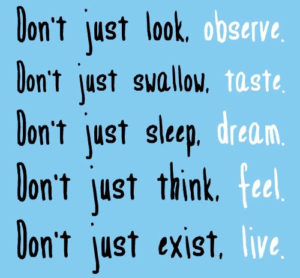
‘Don’t just look, observe.
Don’t just swallow, taste.
Don’t just sleep, dream.
Don’t just think, feel.
Don’t just exist, live.
It is unfortunate then, that most of us struggle to find five minutes to relax and meditate, let alone 30 minutes or more for a meditation session. Studies have shown how mindfulness meditation has many benefits, including reducing depression and pain, easing stress, accelerating cognition, increasing creativity and much more. So it is essential for our well-being to schedule a few minutes every day to cultivate mental spaciousness and achieve a positive mind-body balance.
Mindfulness exercises help us to become more aware of our more difficult and painful thoughts and feelings. The exercises can give us a sense of control over our thoughts, rather than feeling that we are controlled by them.
So…a quick and easy way to introduce some mindfulness meditation into our day is to do a few, simple mindfulness exercises, to empty our minds, to find some precious calm, and which can be slipped into our daily routine without having to always find time for some more formal mindfulness meditation.
11 examples of some easy mindfulness exercises are:
- Mindful walking – those of us who do regular walking every day – whether walking to work or
 walking the dog etc – can incorporate some walking mindfulness into the routine. Focus the attention on the sensation of our feet on the ground and our breath as we move. We can also move our attention to other parts of our body. The important thing is to have a relaxed attention.
walking the dog etc – can incorporate some walking mindfulness into the routine. Focus the attention on the sensation of our feet on the ground and our breath as we move. We can also move our attention to other parts of our body. The important thing is to have a relaxed attention. - Mindful eating – we all eat regularly of course and we can practise mindful eating whilst doing so. When we take the first bite, we should take a moment to pay attention to the taste – really savouring it. We can look at our food carefully, feel the textures, smell it and notice how our body reacts. We don’t need to do this all through the meal! We should just practise it occasionally.
- Mindful mini-break – instead of using our break between tasks to check our email/ Facebook etc we should practise a mindfulness exercise. We could sit for a moment to notice the sensations in our mind and body. Pay attention to how we feel and what we can hear. Try to be as present as possible and when our mind wanders (and it will), gently bring it back to the present and be in the moment.
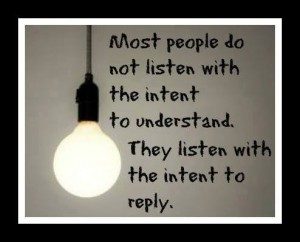
‘Most people do not listen with the intent to understand. They listen with the intent to reply’
- Mindful listening – we very quickly get used to a lot of sounds and learn to tune them out, so when we have the opportunity, we should try some mindful listening. Pay attention to what we can hear around us or put on some music and really listen to it for a while. Our mind may try to wander to things the music reminds us of, or try to think about the lyrics too much, but we should just let the music flow over us.
- Mindful brushing – some habits are mostly done in such a perfunctory way that we hardly notice them! But tonight, instead of allowing our mind to wander off whilst we brush our teeth, we could focus instead on actually experiencing it. Notice how the brush feels on our teeth and the taste of the toothpaste. We can include any chore, such as washing the dishes, or a routine shower, and incorporate mindfulness into the process – bringing our mind back to the present when it wanders off.
- Mindful breathing – we can choose any moment during our day to focus on one breath – perhaps in
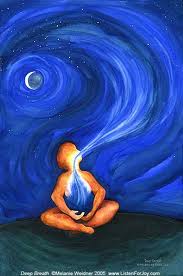 the few seconds before answering the phone or when standing in line somewhere. We can focus our attention on how it feels when we breathe in and breathe out, noticing on how the air expands our chest and abdomen. It’s just a simple, little reminder for our mind to be present.
the few seconds before answering the phone or when standing in line somewhere. We can focus our attention on how it feels when we breathe in and breathe out, noticing on how the air expands our chest and abdomen. It’s just a simple, little reminder for our mind to be present. - Mindful observation – this exercise can help us notice and appreciate our environment in a deeper way. It helps us to connect with the beauty around us, which is often overlooked when we are rushing around. We should choose an object, such as a flower, and focus on it for a minute or two, simply relaxing into watching it for as long as our concentration allow. Look at it as if it’s the first time it’s ever been seen and explore every aspect of it, connecting with its energy and purpose with the world.
- Mindful awareness – similar to mindful brushing, the aim here is to bring a more heightened awareness and appreciation to the everyday simple tasks we do and the results they achieve. Maybe something as simple as opening a door for example, where just as we touch the doorknob to open the door, we can stop for a moment and be mindful of where we are, how we feel in that moment and where the door leads. Or, maybe each time we smell food, we could take a moment to stop and be grateful to have good food to eat and share with our family. It doesn’t have to be a physical touch point cue though – it could be that each time we have a negative thought, we could take a moment to stop, label the thought as unhelpful and release the negativity. Just choose some touch points at some moments in the day to stop and cultivate awareness of what we are doing and the blessings those actions bring to our lives.

‘Today I will live in the moment’
- Mindful Immersion – the thinking behind this exercise is to build contentment in the moment, instead of our normal constant striving to finish one task just to get on with another! We need to take that regular chore and pay attention to every detail – experiencing it like we never have before. For example, when cleaning the house we should feel the motion when brushing up, sense the muscles we are using etc and discover new experiences within this familiar task. Instead of just working through and thinking about finishing the task, we should become aware of every step – fully immersing ourself into the process. We might even end up enjoying the cleaning for once!
- Mindful senses – a simple mindfulness exercise is to focus our awareness through our three senses

How to use your senses to be mindful
of sound, sight and touch on what we are experiencing right now. Taking a few breaths we should think: What are three things I can hear? What are three things I can see? What are three things I can feel? Think about these answers slowly, one sense at a time – it’s impossible to do this without being present and mindful.
- Mindful Appreciation – for this exercise we need to notice five things that we normally overlook – these can be people or objects or a mixture of both. The idea of this is to simply be thankful and appreciate the seemingly insignificant things in our life that support our existence, but that which we hardly give a second thought in our constant craving for bigger and better things. Even something as simple as the electricity that powers our kettle can be appreciated, but how often do we stop to think about how it exists or how it works? Have we recognised how it benefits our life and others? Have we thought about what life would be like without it and how everything is interconnected in this world of ours. I recently watched read a book where the first attack aliens used was to block all electricity in the world and it wasn’t until I truly sat and thought about how much we rely on it that I fully appreciated what it would mean to be without it! There is a saying: ‘If we woke up tomorrow ONLY with the things we were grateful for today, what would we have?’ Makes you think doesn’t it?! So…we should identify our five things and then endeavour to find out everything we can about their creation and purpose, so we can truly appreciate how they support our lives.
These items are great to help us expand our choice of simple little exercises we can use daily:
Mindfulness Pocketbook: Little Exercises for a Calmer Life – this little book has over 100 quick exercises for a wide range of situations in our lives, to help us become calm, collected and present. It will help us develop more mindful thinking, which will benefit us in our personal, social and work life.
The Little Book of Mindfulness: 10 minutes a day to less stress, more calm – these simple 5 and 10 minutes practises will help us rid ourselves of stress and find a more mindful, peaceful and relaxed life.
Stress Less Cards: 50 Inspirational Mindfulness & Meditation Cards – these cards contain 50 effective exercises to help us relieve stress and deal with anxiety whenever we need it. The techniques can be easily memorised and used anywhere to stop that stress reaction and help us relax.
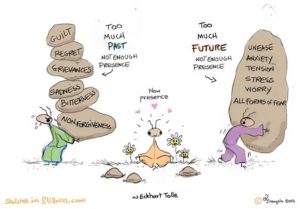 If we can regularly practise the above simple exercises every day for just a few minutes, we will develop a moment-by-moment awareness of our surroundings, which will help us better cope with all the negative thoughts and feelings that create stress and anxiety in our life. When we can control our ability to keep our mind in the present moment – instead of being led subconsciously by our emotions influenced by negative past experiences and fears of future occurrences – we can deal with all life’s challenges in a clear-minded, calm and assertive manner.
If we can regularly practise the above simple exercises every day for just a few minutes, we will develop a moment-by-moment awareness of our surroundings, which will help us better cope with all the negative thoughts and feelings that create stress and anxiety in our life. When we can control our ability to keep our mind in the present moment – instead of being led subconsciously by our emotions influenced by negative past experiences and fears of future occurrences – we can deal with all life’s challenges in a clear-minded, calm and assertive manner.
We will then expand into a fully conscious mind-set where we can escape from unhelpful, self-limiting thought patterns and become fully present to focus on positive emotions that will increase our compassion and understanding of ourselves and others.

meditation
100% Mindfulness meditation: what it does for us!
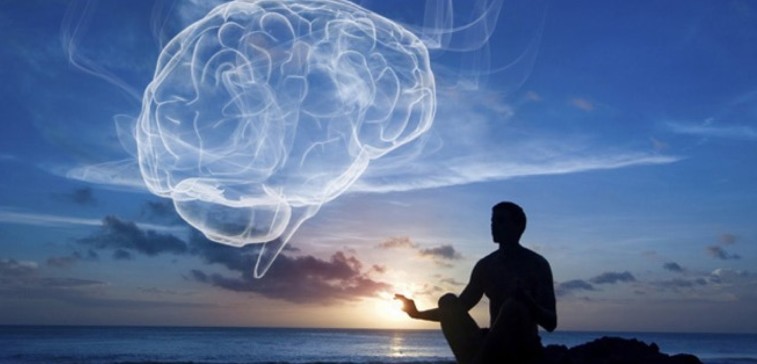
Mindfulness meditation and its health benefits
by Janette Grant 1st June 2018
What is mindfulness meditation? How often do we hear about meditation and mindfulness or even mindfulness benefits these days? The words are frequently  interchangeable and often, in a simplified way, refer to the similar idea – that of calming our frenzied minds. Mindfulness and meditation complement each other, like two sides of the same coin and they often overlap. But each also has its own specific definition and purpose and the main difference is that meditation is the large umbrella term for the practice of reaching ultimate consciousness and concentration, to acknowledge the mind and self-regulate it. It can involve many techniques to achieve this – one of which, is mindfulness. So mindfulness is a form of meditation, along with yoga, silence, breathing etc. There are many forms of meditation, but with mindfulness we bring our full mind to the present and focus completely on the moment. Being mindful of our breath, for example, is a common form of mindfulness during meditation and this improves our awareness of being in the present – this is called mindfulness meditation, or mindfulness buddism.
interchangeable and often, in a simplified way, refer to the similar idea – that of calming our frenzied minds. Mindfulness and meditation complement each other, like two sides of the same coin and they often overlap. But each also has its own specific definition and purpose and the main difference is that meditation is the large umbrella term for the practice of reaching ultimate consciousness and concentration, to acknowledge the mind and self-regulate it. It can involve many techniques to achieve this – one of which, is mindfulness. So mindfulness is a form of meditation, along with yoga, silence, breathing etc. There are many forms of meditation, but with mindfulness we bring our full mind to the present and focus completely on the moment. Being mindful of our breath, for example, is a common form of mindfulness during meditation and this improves our awareness of being in the present – this is called mindfulness meditation, or mindfulness buddism.
The practice of meditation predates mindfulness, which is often aligned with the Buddha when he discovered that focusing completely on his breath allowed him to see reality and reach meditation quicker. Whereas meditation is thought to have its origins in prehistoric religions.
What are the health benefits of combining both mindfulness and meditation?
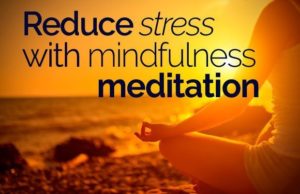
Reduce stress with mindfulness meditation
There is much evidence to suggest that harnessing our mind to be in the present can improve our mental and physical health. A recent study has found that practicing mindfulness can have a positive affect on glucose levels, showing that improved focus and self control can help fight obesity and unhealthy eating habits. Mindfulness meditation has also been linked to improved sleep quality amongst older adults who would normally end up using sleeping pills. It has been associated with improved focus, reduced dependency on opioid drugs and lowered anxiety and depression levels. And even more impressive is that research has recently shown that mindfulness exercises and positive thinking can have a beneficial effect on the DNA of breast cancer patients, which suggests that mindfulness meditation can have an even more extensive effect on our bodies than we even thought! 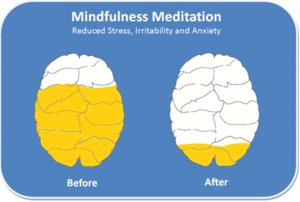
Mindfulness meditation helps us become aware of what is already true moment by moment, rather than attempting to make us different from how we are -mindfulness training additionally present with whatever is happening in our lives – no matter what that is. How does that help? Surely we want to suffer less and tune into the natural wisdom? Isn’t that making changes from how we are? Well yes…it is…suffering less and becoming more aware of our inherent wakefulness are changes from how we experience ourself most of the time, but…the only way to alleviate suffering and find our inherent wisdom is to dig more deeper into the present moment and into ourselves as we already are – not by trying to change what is happening.
Buddhists teaches how to practice mindfulness in helping escape from our direct experience; we try to get away from our pain and hang on to pleasure, but this just perpetuates our suffering. And we cause more suffering when we try to hang on to our ego.
Instead, when practising mindfulness meditation – paying precise, nonjudgmental attention to our experiences as they happen – we do not reject anything. In this way, we do not struggle to get away from difficult experiences – we merely practise being able to be with them. Equally importantly, we need to practise mindfulness during pleasant experiences as well; we often struggle to simply stay present with happiness and instead turn it into worrying that it won’t last or we try to keep it from disappearing.
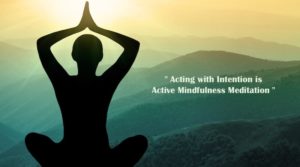
Acting with intention is Active Mindfulness Meditation
When we are mindful, we show up for our lives; we don’t miss them through distraction or in wishing things could be different. Instead, if something needs changing, being mindful means that we are present enough to understand what needs to be done. But being mindful should not prevent us from actually participating in our lives and taking care of our own and others’ needs; the more mindful we are, the more compassionate we will be.
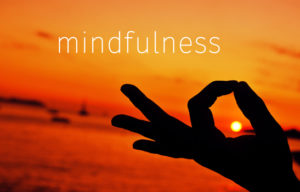 Remember – mindfulness meditation is all about being mindful of whatever happens. It is not about trying to stop ourselves thinking – this is not the aim. Many people think that meditation is about emptying our mind, but this is certainly not true for mindfulness meditation. So remember…when you are aware of thoughts running through your mind (and they will), just include them in what you notice…don’t try to get rid of them. It won’t work anyway, and it’s not what mindfulness meditation is about. We are just trying to be with ourselves as we are – not trying to change ourselves into some preconceived idea of what we think we should be.
Remember – mindfulness meditation is all about being mindful of whatever happens. It is not about trying to stop ourselves thinking – this is not the aim. Many people think that meditation is about emptying our mind, but this is certainly not true for mindfulness meditation. So remember…when you are aware of thoughts running through your mind (and they will), just include them in what you notice…don’t try to get rid of them. It won’t work anyway, and it’s not what mindfulness meditation is about. We are just trying to be with ourselves as we are – not trying to change ourselves into some preconceived idea of what we think we should be.
As we’ve already discussed, mindfulness meditation can have an enormously beneficial impact on our lives and so even as a beginner, if we just take ten minutes out of our day to be mindful – when drinking our tea, taking a break from work, or just focusing on our breath before sleep – there’s an amazing amount of power when we simply focus our mind.
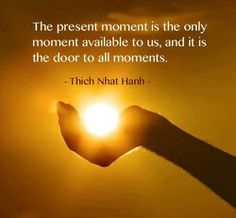
‘The present moment is the only moment available to us, and it is the door to all moments’ Thich Nhat Hanh
There are many books and audiobooks etc. available about Mindfulness meditation, but some of the most popular items are:
Wherever You Go, There You Are: Mindfulness Meditation for Everyday Life – this book is written by the father of modern day mindfulness – Jon Kabat-Zinn and he shows us how to cultivate mindfulness in our lives and awaken us to the possibilities of each present moment.
Guided Mindfulness Meditation (audio CD) – this audiobook is also read by Jon Kabat-Zinn and he explains how the power of mindfulness can bring change to our personal lives, and the world around us, from learning, growing and healing.
The Headspace Guide to Mindfulness & Meditation: 10 minutes can make the difference – this book is for beginners and expert meditators alike and it teaches skills to combat the negative aspects of our busy lives. These powerful techniques will help us to quiet the mind, feel less stressed and less tired and achieve calm and fulfilment.
Stress Less Cards – 50 Inspirational Mindfulness & Meditation Exercises – these cards contain 50 effective exercises to help us relieve stress and deal with anxiety whenever we need it. The techniques can be easily memorised and used anywhere to stop that stress reaction and help us relax.






